英语句型中一般疑问句的用户和例句
- 格式:docx
- 大小:13.46 KB
- 文档页数:1
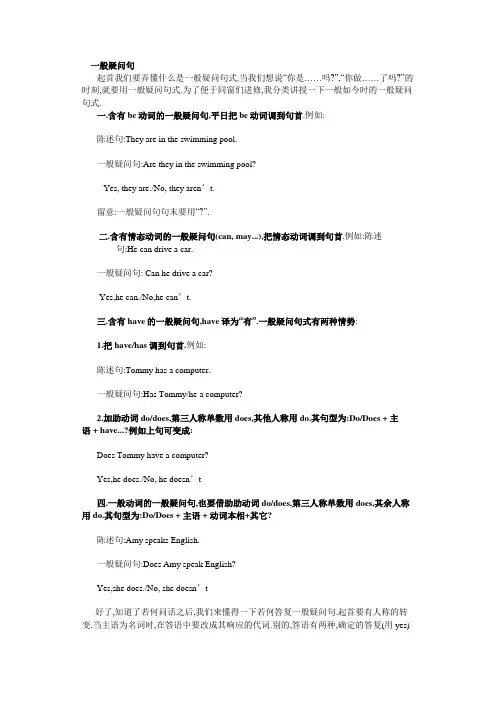
一般疑问句起首我们要弄懂什么是一般疑问句式.当我们想说“你是……吗?”,“你做……了吗?”的时刻,就要用一般疑问句式.为了便于同窗们进修,我分类讲授一下一般如今时的一般疑问句式.一.含有be动词的一般疑问句,平日把be动词调到句首.例如:陈述句:They are in the swimming pool.一般疑问句:Are they in the swimming pool?Yes, they are./No, they aren’t.留意:一般疑问句句末要用“?”.二.含有情态动词的一般疑问句(can, may...),把情态动词调到句首.例如:陈述句:He can drive a car.一般疑问句: Can he drive a car?Yes,he can./No,he can’t.三.含有have的一般疑问句,have译为“有”.一般疑问句式有两种情势:1.把have/has调到句首.例如:陈述句:Tommy has a computer.一般疑问句:Has Tommy/he a computer?2.加助动词do/does,第三人称单数用does,其他人称用do.其句型为:Do/Does + 主语 + have...?例如上句可变成:Does Tommy have a computer?Yes,he does./No, he doesn’t四.一般动词的一般疑问句,也要借助助动词do/does,第三人称单数用does,其余人称用do.其句型为:Do/Does + 主语 + 动词本相+其它?陈述句:Amy speaks English.一般疑问句:Does Amy speak English?Yes,she does./No, she doesn’t好了,知道了若何问话之后,我们来懂得一下若何答复一般疑问句.起首要有人称的转变.当主语为名词时,在答语中要改成其响应的代词.别的,答语有两种,确定的答复(用yes)和否认的答复(用no),否认式经常应用缩写情势.如今照样让我们分句型一一解释.一.一般疑问句含be动词时,用be动词答复,句末用句号.例如:-Is Mary your sister?-Yes, she is. / No, she isn’t.(缩写)二.一般疑问句含有情态动词(can, may, should等)时,用情态动词答复.例如:-May I come in?-Yes, you may. / No, you can’t. /Come in, please.三.一般疑问句含有have(译为“有”)时,有两种答复方法.1.直接用have/has答复.例如:-Have they any pictures?-Yes, they have. / No, they haven’t.2.用助动词do/does答复.例如:-Does Millie smoke?-Yes, she does. / No, she doesn’t.四.一般动词的一般疑问句答复时也用助动词.例如:-Do the workers live in London?-Yes, they do. / No, they don’t.一、一般疑问句一般疑问句也可称为“yes /no questions”,因这种问句通经常应用yes / no来答复,相当于汉语中的“……吗?”其语序是:系动词be /助动词/情态动词+主语+其他成分?如:Are you from Japan?Yes ,I am./No, I'm not.Is her sister doing her homework now?Yes ,she is./No ,she isn't.Does he work in a bank?Yes ,he does./ No, he doesn't.Do you live near your school?Yes ,I do./No,I don't.Can you speak French?Yes, I can./No, I can't.May I go home now?Yes ,you may./ No ,you mustn't.留意:1.将陈述句变成一般疑问句时,如句中有be 动词(am is are …)时,可直接将它们提至主语前.如主语为第一人称,应将其改为第二人称.如:I'm in Class 2Grade 1.→ Are you in Class 2,Grade 1?We're watching TV.→ Are you watching TV?2.陈述句中有情态动词(can maymust …)时,也可直接将它们提至主语前,即可成为一般疑问句.如:He can swim now.→ Can he swim now?The children may come with us.→ May the children come with us?3.陈述句中只有一个实义动词作谓语且当时态为一般如今时,变成一般疑问句时要在句首加do或does 主语后的实义动词用本相.如:I like these animals.→ Do you like these animals?She wants to go to the movies.→ Does she want to go to the movies?4.一般疑问句一般读升调(↑) 5.一般疑问句有时不必yes或 no 答复.如:Are they in town now?I think so. May I sit here?Certainly.Does he like soccer?Sorry, I don't know.一般疑问句演习情形1: Be(是) am is are先用be的恰当情势填空然后按照请求变换句型l I ____ a teacher.一般疑问句:_______________________________确定答复:____________________________否认答复:____________________________l You _____ a worker.一般疑问句:_______________________________确定答复:____________________________否认答复:____________________________l He ____ a doctor.一般疑问句:_______________________________确定答复:____________________________否认答复:____________________________l ______ she a student?陈述句:_______________________________确定答复:____________________________否认答复:____________________________l ______ we happy?陈述句:_______________________________确定答复:____________________________否认答复:____________________________l You _____ good workers.一般疑问句:_______________________________确定答复:____________________________否认答复:____________________________l They _____ workers.一般疑问句:_______________________________确定答复:____________________________否认答复:____________________________l ______ (它是) an apple.一般疑问句:_______________________________确定答复:____________________________否认答复:____________________________情形2:have(是) have(第一二人称单复数及第三人称复数) has (第三人称单数)l I _____ three books.一般疑问句:_______________________________确定答复:____________________________否认答复:____________________________l You _____ a car.一般疑问句:_______________________________确定答复:____________________________否认答复:____________________________He ____ many trees.一般疑问句:_______________________________确定答复:____________________________否认答复:____________________________She ____ five beautiful dresses.一般疑问句:_______________________________确定答复:____________________________否认答复:_________________________________________(我们有) a television?陈述句:_______________________________确定答复:____________________________否认答复:____________________________They _____ a house in Shenzhen.一般疑问句:_______________________________确定答复:____________________________否认答复:____________________________情形3.情态动词cancould为can的曩昔式,都能暗示能,或者请求他人的允许.在暗示请求时,曩昔式不代表曩昔时态,而是使得语气加倍委婉.I can speak English.我能说英语.一般疑问句:_______________________________确定答复:____________________________否认答复:____________________________They can swim.他们能泅水.一般疑问句:_______________________________确定答复:____________________________You can collect the plates for me.(帮我收失落这些碟子.收罗允许)一般疑问句:_______________________________我能帮你收失落这些碟子吗?确定答复:____________________________否认答复:____________________________情形4.用助动词do,does提问(留意提问时后面的实义动词要用原型!)I like reading books.一般疑问句:_______________________________确定答复:____________________________否认答复:____________________________He listens to the story.他听故事.一般疑问句:_______________________________确定答复:____________________________否认答复:____________________________They watch the movie today.一般疑问句:_______________________________确定答复:____________________________否认答复:____________________________She teaches them English.一般疑问句:_______________________________确定答复:____________________________否认答复:____________________________He wants to go to Beijing.一般疑问句:_______________________________确定答复:____________________________否认答复:____________________________情形5:there be表消失,“有”!There is a bird in the tree.一般疑问句:_______________________________确定答复:____________________________否认答复:____________________________There is a thief(小偷) in the room.一般疑问句:_______________________________确定答复:____________________________There are five eggs on the table.一般疑问句:_______________________________确定答复:____________________________否认答复:____________________________There were six students in the classroom yesterday.一般疑问句:_______________________________确定答复:____________________________否认答复:____________________________。
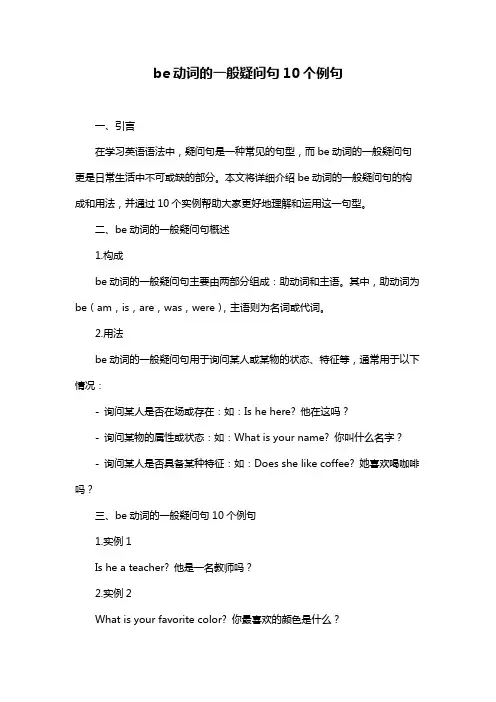
be动词的一般疑问句10个例句一、引言在学习英语语法中,疑问句是一种常见的句型,而be动词的一般疑问句更是日常生活中不可或缺的部分。
本文将详细介绍be动词的一般疑问句的构成和用法,并通过10个实例帮助大家更好地理解和运用这一句型。
二、be动词的一般疑问句概述1.构成be动词的一般疑问句主要由两部分组成:助动词和主语。
其中,助动词为be(am,is,are,was,were),主语则为名词或代词。
2.用法be动词的一般疑问句用于询问某人或某物的状态、特征等,通常用于以下情况:- 询问某人是否在场或存在:如:Is he here? 他在这吗?- 询问某物的属性或状态:如:What is your name? 你叫什么名字?- 询问某人是否具备某种特征:如:Does she like coffee? 她喜欢喝咖啡吗?三、be动词的一般疑问句10个例句1.实例1Is he a teacher? 他是一名教师吗?2.实例2What is your favorite color? 你最喜欢的颜色是什么?3.实例3Are they playing soccer? 他们在踢足球吗?4.实例4Was she born in New York? 她出生在纽约吗?5.实例5Were you at the party last night? 昨晚你参加了派对吗?6.实例6Is the library open? 图书馆开门了吗?7.实例7Does she speak French? 她会说法语吗?8.实例8Are they brothers? 他们是兄弟吗?9.实例9What was the movie about? 这部电影讲的是什么?10.实例10Is it hot today? 今天很热吗?四、结论通过以上10个实例,我们可以看出be动词的一般疑问句在英语交流中无处不在。
掌握这一句型,不仅有助于我们更好地提问,还能提高英语表达的准确性和地道性。
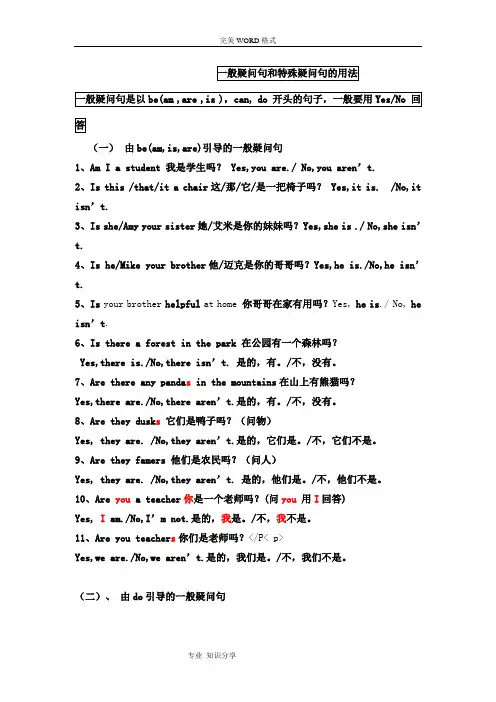
(一)由be(am,is,are)引导的一般疑问句1、Am I a student 我是学生吗? Yes,you are./ No,you aren’t.2、Is this /that/it a chair这/那/它/是一把椅子吗? Yes,it is. /No,it isn’t.3、Is she/Amy your sister她/艾米是你的妹妹吗?Yes,she is ./ No,she isn’t.4、Is he/Mike your brother他/迈克是你的哥哥吗?Yes,he is./No,he isn’t.5、Is your brother helpful at home 你哥哥在家有用吗?Yes, he is./ No, he isn’t.6、Is there a forest in the park 在公园有一个森林吗?Yes,there is./No,there isn’t. 是的,有。
/不,没有。
7、Are there any panda s in the mountains在山上有熊猫吗?Yes,there are./No,there aren’t.是的,有。
/不,没有。
8、Are they dusk s它们是鸭子吗?(问物)Yes, they are. /No,they aren’t.是的,它们是。
/不,它们不是。
9、Are they famers 他们是农民吗?(问人)Yes, they are. /No,they aren’t. 是的,他们是。
/不,他们不是。
10、Are you a teacher你是一个老师吗?(问you 用I回答)Yes, I am./No,I’m not.是的,我是。
/不,我不是。
11、Are you teacher s你们是老师吗?</P< p>Yes,we are./No,we aren’t.是的,我们是。
/不,我们不是。
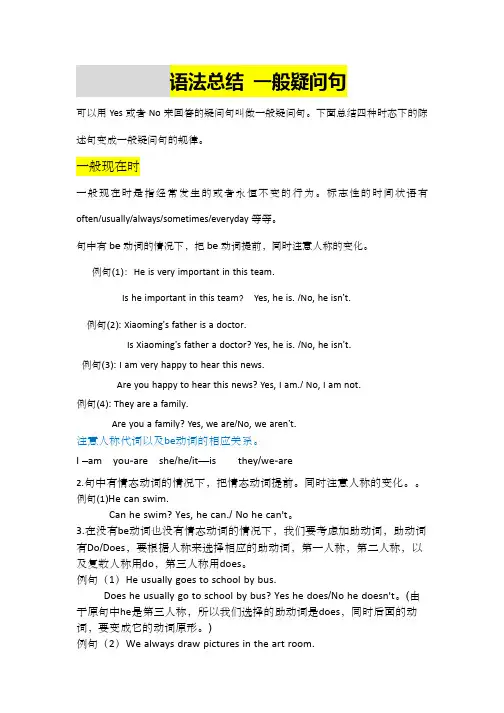
语法总结一般疑问句可以用Yes或者No来回答的疑问句叫做一般疑问句。
下面总结四种时态下的陈述句变成一般疑问句的规律。
一般现在时一般现在时是指经常发生的或者永恒不变的行为。
标志性的时间状语有often/usually/always/sometimes/everyday等等。
句中有be动词的情况下,把be动词提前,同时注意人称的变化。
例句(1):He is very important in this team.Is he important in this team?Yes,he is. /No,he isn’t.例句(2): Xiaoming’s father is a doctor.Is Xiaoming’s father a doctor?Yes,he is. /No,he isn’t.例句(3): I am very happy to hear this news.Are you happy to hear this news?Yes,I am./ No,I am not.例句(4): They are a family.Are you a family?Yes,we are/No,we aren’t.注意人称代词以及be动词的相应关系。
I–am you-are she/he/it—is they/we-are2.句中有情态动词的情况下,把情态动词提前。
同时注意人称的变化。
例句(1)He can swim.Can he swim?Yes,he can./ No he can't。
3.在没有be动词也没有情态动词的情况下,我们要考虑加助动词,助动词有Do/Does,要根据人称来选择相应的助动词,第一人称,第二人称,以及复数人称用do,第三人称用does。
例句(1)He usually goes to school by bus.Does he usually go to school by bus?Yes he does/No he doesn't。
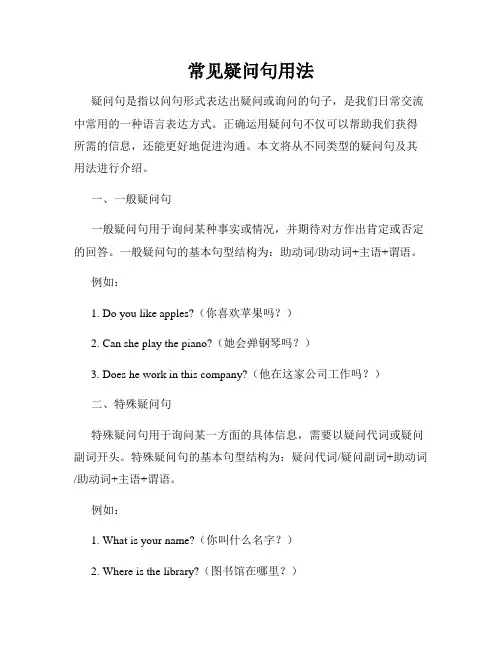
常见疑问句用法疑问句是指以问句形式表达出疑问或询问的句子,是我们日常交流中常用的一种语言表达方式。
正确运用疑问句不仅可以帮助我们获得所需的信息,还能更好地促进沟通。
本文将从不同类型的疑问句及其用法进行介绍。
一、一般疑问句一般疑问句用于询问某种事实或情况,并期待对方作出肯定或否定的回答。
一般疑问句的基本句型结构为:助动词/助动词+主语+谓语。
例如:1. Do you like apples?(你喜欢苹果吗?)2. Can she play the piano?(她会弹钢琴吗?)3. Does he work in this company?(他在这家公司工作吗?)二、特殊疑问句特殊疑问句用于询问某一方面的具体信息,需要以疑问代词或疑问副词开头。
特殊疑问句的基本句型结构为:疑问代词/疑问副词+助动词/助动词+主语+谓语。
例如:1. What is your name?(你叫什么名字?)2. Where is the library?(图书馆在哪里?)3. How did you go to school?(你怎么去学校的?)三、选择疑问句选择疑问句是指在句末陈述事实,但希望对方从中选择正确的答案。
句末使用或者的问号表明选择的范围。
选择疑问句的基本句型结构为:陈述句+或者/还是+陈述句?例如:1. Are you coming by train or by bus?(你是坐火车还是坐公交车来的?)2. Do you prefer coffee or tea?(你更喜欢咖啡还是茶?)3. Is he a doctor or a teacher?(他是医生还是教师?)四、反意疑问句反意疑问句是用来在表达疑问的同时,附带表达一种期望的情绪或意见的句子。
反意疑问句的基本结构为:陈述句+附带的肯定/否定式疑问句。
例如:1. You are a student, aren't you?(你是学生,对吗?)2. She doesn't like him, does she?(她不喜欢他,是吗?)3. We should go now, shouldn't we?(我们现在应该走了,对吗?)总结:常见疑问句的运用可以更好地促进交流与沟通。
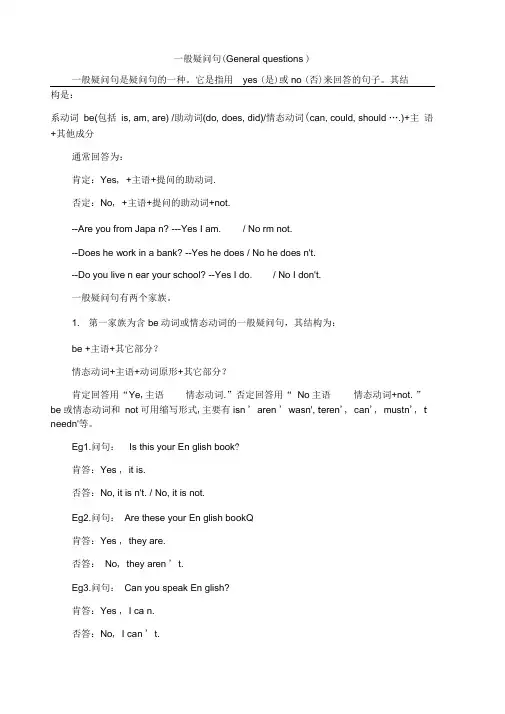
一般疑问句(General questions )一般疑问句是疑问句的一种。
它是指用yes (是)或no (否)来回答的句子。
其结构是:系动词be(包括is, am, are) /助动词(do, does, did)/情态动词(can, could, should ….)+主语+其他成分通常回答为:肯定:Yes, +主语+提问的助动词.否定:No, +主语+提问的助动词+not.--Are you from Japa n? ---Yes I am. / No rm not.--Does he work in a bank? --Yes he does / No he does n't.--Do you live n ear your school? --Yes I do. / No I don't.一般疑问句有两个家族。
1. 第一家族为含be动词或情态动词的一般疑问句,其结构为:be +主语+其它部分?情态动词+主语+动词原形+其它部分?肯定回答用“Ye,主语情态动词.”否定回答用“ No主语情态动词+not. ”be或情态动词和not可用缩写形式,主要有isn ' aren ' wasn', t eren', can', mustn', t needn'等。
Eg1.问句:Is this your En glish book?肯答:Yes , it is.否答:No, it is n't. / No, it is not.Eg2.问句:Are these your En glish bookQ肯答:Yes , they are.否答:No, they aren ' t.Eg3.问句:Can you speak En glish?肯答:Yes , I ca n.否答:No, I can ' t.注意例句1和例句2,在回答时必须将this'that与these'those分别变为it和they。
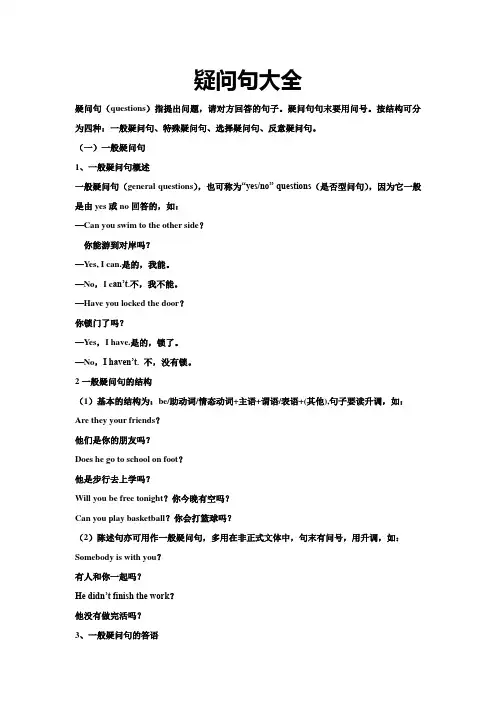
疑问句大全疑问句(questions)指提出问题,请对方回答的句子。
疑问句句末要用问号。
按结构可分为四种:一般疑问句、特殊疑问句、选择疑问句、反意疑问句。
(一)一般疑问句1、一般疑问句概述一般疑问句(general questions),也可称为“yes/no” questions(是否型问句),因为它一般是由yes或no回答的,如:—Can you swim to the other side?你能游到对岸吗?—Yes, I can.是的,我能。
—No,I c an’t.不,我不能。
—Have you locked the door?你锁门了吗?—Yes,I have.是的,锁了。
—No,I haven’t. 不,没有锁。
2一般疑问句的结构(1)基本的结构为:be/助动词/情态动词+主语+谓语/表语+(其他),句子要读升调,如:Are they your friends?他们是你的朋友吗?Does he go to school on foot?他是步行去上学吗?Will you be free tonight?你今晚有空吗?Can you play basketball?你会打篮球吗?(2)陈述句亦可用作一般疑问句,多用在非正式文体中,句末有问号,用升调,如:Somebody is with you?有人和你一起吗?He didn’t finish the work?他没有做完活吗?3、一般疑问句的答语(1)一般疑问句一般由yes或no来回答,如:—Are you tired?你累了吗?—Yes,I am.是的,累了。
—No, I’m not.不,不累。
—Does she do the cleaning?她扫除了吗?—Yes ,she does.是的,她打扫了。
—No,she doesn’t.不,她没打扫。
2)回答一般疑问句除了用yes或no外,也可用certainly,probably,perhaps,of course,all right,with pleasure等代替yes,用never,not at all等代替no,如:—Can you help me?你能帮个忙吗?—Certainly.当然。
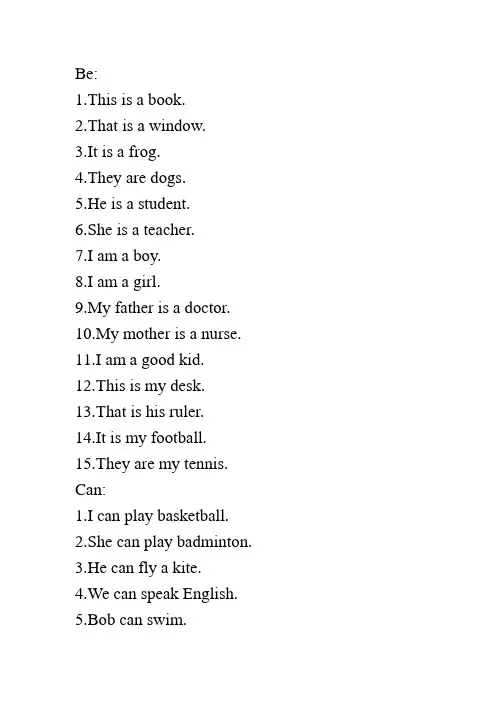
Be:1.This is a book.2.That is a window.3.It is a frog.4.They are dogs.5.He is a student.6.She is a teacher.7.I am a boy.8.I am a girl.9.My father is a doctor.10.My mother is a nurse.11.I am a good kid.12.This is my desk.13.That is his ruler.14.It is my football.15.They are my tennis. Can:1.I can play basketball.2.She can play badminton.3.He can fly a kite.4.We can speak English.5.Bob can swim.6.Vivian can run.7.My uncle can jump.8.His sister can play the piano. Do:1.I like Art.2.I like English.3.I like Chinese.4.She likes Music.5.He likes play table tennis.6.Lily likes red.7.I have a good friend.8.Leo has a lizard.9.My sister has some flowers.10.My dad gets up at 6:00.11.I eat breakfast in the morning.12.He goes to school at 8:00.1.His father is an English teacher.2.These cats are crying.3.They can swim.4.I like to read English.5.I go to school on foot.6.He likes English.7.His father goes to work by bus.8.He is crying under the tree.9.His birthday is on the twentieth of November.10.Mrs. Li and Kitty are in a big shop.11.Kitty is wearing her new uniform.12.The boy under the tree is hungry.13.He goes to school every day.14.I want to have a model car.15.She wants a cup of coffee.16.Mrs. Li and Kitty watch television at night.I do my homework after school.。
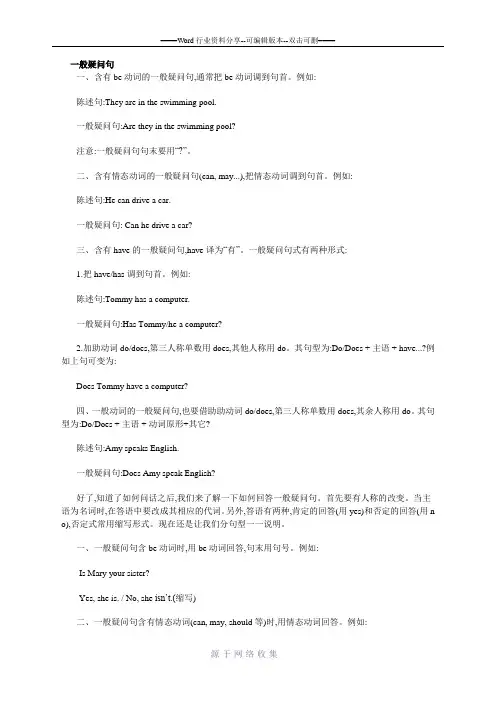
一般疑问句一、含有be动词的一般疑问句,通常把be动词调到句首。
例如:陈述句:They are in the swimming pool.一般疑问句:Are they in the swimming pool?注意:一般疑问句句末要用“?”。
二、含有情态动词的一般疑问句(can, may...),把情态动词调到句首。
例如:陈述句:He can drive a car.一般疑问句: Can he drive a car?三、含有have的一般疑问句,have译为“有”。
一般疑问句式有两种形式:1.把have/has调到句首。
例如:陈述句:Tommy has a computer.一般疑问句:Has Tommy/he a computer?2.加助动词do/does,第三人称单数用does,其他人称用do。
其句型为:Do/Does + 主语 + have...?例如上句可变为:Does Tommy have a computer?四、一般动词的一般疑问句,也要借助助动词do/does,第三人称单数用does,其余人称用do。
其句型为:Do/Does + 主语 + 动词原形+其它?陈述句:Amy speaks English.一般疑问句:Does Amy speak English?好了,知道了如何问话之后,我们来了解一下如何回答一般疑问句。
首先要有人称的改变。
当主语为名词时,在答语中要改成其相应的代词。
另外,答语有两种,肯定的回答(用yes)和否定的回答(用n o),否定式常用缩写形式。
现在还是让我们分句型一一说明。
一、一般疑问句含be动词时,用be动词回答,句末用句号。
例如:-Is Mary your sister?-Yes, she is. / No, she isn’t.(缩写)二、一般疑问句含有情态动词(can, may, should等)时,用情态动词回答。
例如:-May I come in?-Yes, you may. / No, you can’t.三、一般疑问句含有have(译为“有”)时,有两种回答方式。
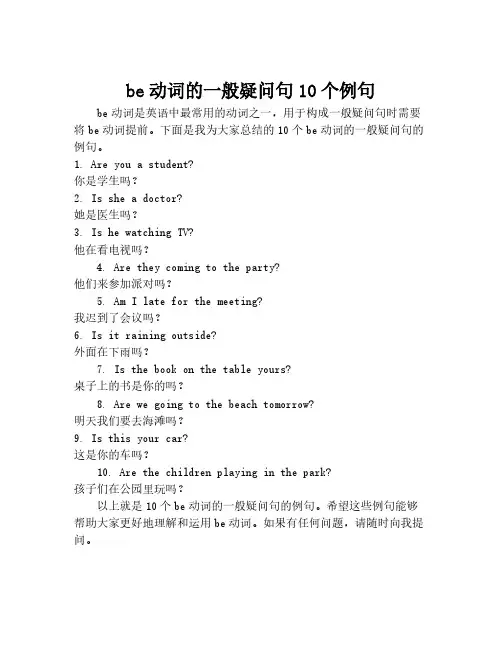
be动词的一般疑问句10个例句be动词是英语中最常用的动词之一,用于构成一般疑问句时需要将be动词提前。
下面是我为大家总结的10个be动词的一般疑问句的例句。
1. Are you a student?
你是学生吗?
2. Is she a doctor?
她是医生吗?
3. Is he watching TV?
他在看电视吗?
4. Are they coming to the party?
他们来参加派对吗?
5. Am I late for the meeting?
我迟到了会议吗?
6. Is it raining outside?
外面在下雨吗?
7. Is the book on the table yours?
桌子上的书是你的吗?
8. Are we going to the beach tomorrow?
明天我们要去海滩吗?
9. Is this your car?
这是你的车吗?
10. Are the children playing in the park?
孩子们在公园里玩吗?
以上就是10个be动词的一般疑问句的例句。
希望这些例句能够帮助大家更好地理解和运用be动词。
如果有任何问题,请随时向我提问。
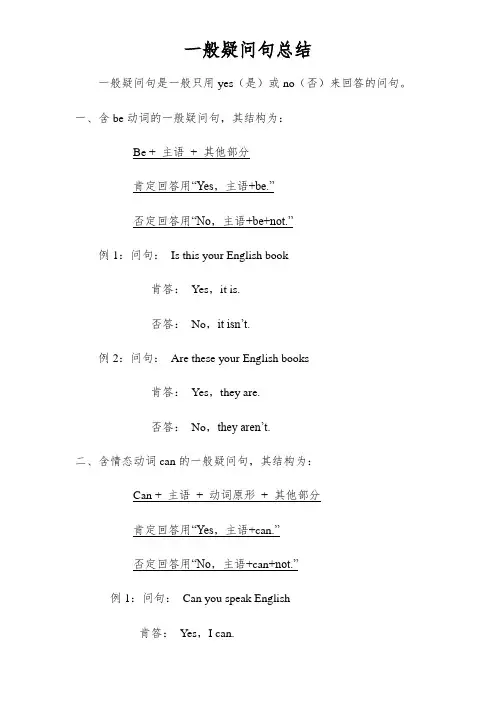
一般疑问句总结一般疑问句是一般只用yes(是)或no(否)来回答的问句。
一、含be动词的一般疑问句,其结构为:Be + 主语+ 其他部分肯定回答用“Yes,主语+be.”否定回答用“No,主语+be+not.”例1:问句:Is this your English book肯答:Yes,it is.否答:No,it isn’t.例2:问句:Are these your English books肯答:Yes,they are.否答:No,they aren’t.二、含情态动词can的一般疑问句,其结构为:Can + 主语+ 动词原形+ 其他部分肯定回答用“Yes,主语+can.”否定回答用“No,主语+can+not.”例1:问句:Can you speak English肯答:Yes,I can.否答:No,I can’t.例2:问句:Can he play football肯答:Yes,he can.否答:No,he can’t.三、含行为动词(或称为实义动词)的一般疑问句,其结构为:Do/Does + 主语+ 动词原形+ 其他部分肯定回答用“Yes, 主语+ do/does.”否定回答用“No, 主语+do/does+not.”例1:问句:Do you like English肯答:Yes,I do.否答:No,I don’t.例2: 问句:Does he go to school by bus肯答:Yes,he does.否答:No,he does not.四、there be句型的一般疑问句,其结构为:Be there + 其他部分肯定回答用“Yes, there be.”否定回答用“No, there be+not.”例1:问句: Is there a river in the forest肯答:Yes,there is.否答:No,there isn’t.例2:问句: Are there any tall buildings in the nature park 肯答:Yes,there are.否答:No,there aren’t.。
英语中的一般疑问句“一般疑问句”主要分为三类:一、be动词类型。
二、情态动词can、may、should、must。
三、行为动词类型。
一、be动词类型(am/is/are)I am a student.(陈述句)I am not a student.(否定句)Are you a student?(一般疑问句)Yes,I am.(肯定回答)No,I am not.(否定回答)总结:含有be动词的句子,直接在be动词后加not变成否定句,is not=isn't,are not=aren't。
将be动词直接提到句子主语前,注意将第一人称换成第二人称,即I换成you,we换成you。
二、情态动词类型(can/may/should/must)He can play basketball.(陈述句)He can not play basketball.(否定句)Can he play basketball?(一般疑问句)Yes,he can.(肯定回答)No,he can not.(否定回答)总结:含有情态动词的句子,变否定直接在情态动词后加not,变一般疑问句直接将情态动词提前。
三、行为动词类型I go to school by bike.(陈述句)I do not go to school by bike.(否定句)Do you go to school by bike?(一般疑问句)Yes,I do.(肯定回答)No,I do not.(否定回答)She goes to school by bike.(陈述句)She does not go to school by bike.(否定句)Does she go to school by bike?(一般疑问句)Yes,she does.(肯定回答)No,she does not.(否定回答)总结:行为动词变否定和一般疑问需要借助助动词do 或者does,当主语是第三人称单数时,助动词用does。
一般疑问句英文的例子及范文General questions in English are used to ask for information or to confirm a statement. They typically begin with words such as "do," "does," "is," "are," "can," "could," "will," "would," "shall," "should," "may," "might," "has," "have," or "had." The structure of a general question in English is usually subject + auxiliary verb + main verb.For example, "Do you like pizza?" "Is the weather nice today?" "Can you help me with my homework?" "Will you be available this weekend?" These are all examples of general questions in English.One common type of general question is the yes/no question. These questions can be answered with a simple "yes" or "no." For instance, "Do you enjoy reading?" "Is your birthday next month?" "Can you swim?" These are all yes/no questions.Another type of general question is the information question. These questions ask for more specific information and typically begin with words like "what," "when," "where," "why," "who," or "how." For example, "What is your favorite color?" "When is the next holiday?""Where do you live?" "Why did you decide to study English?" "Who is the president of the United States?" "How do you make a grilled cheese sandwich?"General questions can also be used to confirm a statement or ask for agreement. For instance, "You're going to the party tonight, aren't you?" "She's the new employee, isn't she?" "They don't like spicy food, do they?" These types of questions are called tag questions.Do you enjoy traveling to new places? I find it to be such an exciting and enriching experience. Where have you traveled to recently? I went on a trip to Italy last summer and had an amazing time exploring the historic cities and trying all the delicious food. Can you recommend any must-see destinations? I'm already starting to plan my next vacation. When is the best time of year to visit your favorite places? I'm hoping to go somewhere tropical during the winter months to escape the cold weather. How do you typically prepare for a big trip? I always make sure to pack plenty of comfortable clothes and have my passport ready to go. Isn't traveling just the best way to learn about different cultures and meet new people? I agree, it's such an invaluable opportunity. Will you be taking any trips in the near future?In this paragraph, we see several examples of general questions being used to engage the reader, ask for information, and confirm statements. The questions flow naturally and help to create a conversational tone.Are you familiar with the benefits of meditation? It's a practice that has become increasingly popular in recent years. Do you currently meditate on a regular basis? I started meditating a few months ago and have noticed some really positive changes. Can you guess what some of the main benefits are? Meditation has been shown to reduce stress and anxiety, improve focus and concentration, and even boost immune function. Isn't that incredible? Have you ever tried guided meditations before? I find them to be really helpful, especially when I'm just starting out. Where do you typically meditate? I like to find a quiet space in my home where I can sit comfortably. How long do you usually meditate for? I try to do it for at least 10-15 minutes each day. Wouldn't you agree that making time for self-care activities like meditation is so important?This paragraph demonstrates how general questions can be used to introduce a topic, share personal experiences, and invite the reader to reflect on and engage with the subject matter.Overall, general questions in English are a useful tool for sparking conversation, gathering information, and confirming statements. By incorporating a variety of question types, writers and speakers can create a more dynamic and interactive dialogue.。
一、什么是一般疑问句?一般说来,英语有四种问句,分别是一般疑问句、特别疑问句、选择疑问句和反意义疑问句。
今天我们来学习一般疑问句。
那么,什么是一般疑问句呢?我们一起来听听一般疑问句的自白:“Hello, 大家好!我是一般疑问句,我的天性是爱发问。
我最爱做的事是询问某种情况是否属实,您不对我做出肯定或否认答复我是不会罢休的。
您也可用肢体言语来打发我,比方点头或则摇头。
所以我有一对好朋友,猜猜是什么?对了,YES 和NO!〞二、一般疑问句的结构一般疑问句有两个家族。
第—家族为含be动词或情态动词的一般疑问句,其结构为:be + 主语+ 其它局部?情态动词+ 主语+ 动词原形+ 其它局部?肯定答复用“Yes,主语+be\情态动词.〞,否认答复用“No,主语+be\情态动词+not.〞。
be或情态动词和not可用缩写形式,主要有isn’t,aren’t,wasn’t,weren’t,can’t,mustn’t,needn’t等。
Eg1. 问句:Is this your English book?肯答:Yes,it is.否答:No,it isn`t.Eg2. 问句:Are these your English books?肯答:Yes,they are.否答:No,they aren’t.Eg3. 问句:Can you speak English肯答:Yes,I can.否答:No,I can’t.注意例句1和例句2,在答复时必须将this\that与these\those分别变为it和they。
另一家族为含行为动词〔或称为实义动词〕的一般疑问句,其结构为:助动词+ 主语+ 动词原形+ 其它?肯定答复用“Yes, 主语+ do\does.〞,否认答复用“No, 主语+don\does not.〞。
助动词也常用缩写形式,主要有don’t,doesn’t,didn’t等。
Eg4. 问句:Do your parents like English?肯答:Yes,they do.否答:No,they don’t.三、一般疑问句的答复正如前面所述,答复一般疑问句时有肯定答复和否认答复两种方法,肯定答复以Yes起句,否认答复用No开头。
一般疑问句20个例句英语1. Do you like coffee?你喜欢咖啡吗?2. Is she coming to the party?她会来参加聚会吗?3. Are they playing soccer in the park?他们在公园里踢足球吗?4. Can you help me with this problem?你能帮我解决这个问题吗?5. Will it rain tomorrow?明天会下雨吗?6. Have you seen my keys?你见过我的钥匙吗?7. Did he finish his homework?他完成作业了吗?8. Is it your birthday today?今天是你的生日吗?9. Are you going to the concert tonight?你今晚要去听音乐会吗?10. Would you like some dessert?你想要些甜点吗?11. Do they live nearby?他们住在附近吗?12. Is this the right way to the station?这是去车站的正确路吗?13. Can she speak French?她会说法语吗?14. Are we meeting at 6 PM?我们下午6点见面吗?15. Will you join us for dinner?你会和我们一起吃晚餐吗?16. Have you read this book?你读过这本书吗?17. Did they travel abroad last year?他们去年出国旅行了吗?18. Is he a good singer?他是个好歌手吗?19. Are you feeling okay?你感觉好吗?20. Can I borrow your pen?我可以借你的笔吗?。
一、什么是一般疑问句?一般说来,英语中共有四种问句,分别是一般疑问句、特殊疑问句、选择疑问句和反意义疑问句。
今天我们来学习一般疑问句。
那么,什么是一般疑问句呢?我们一起来听听一般疑问句的自白:“Hello, 大家好!我是一般疑问句,我的天性是爱发问。
我最爱做的事是询问某种情况是否属实,您不对我做出肯定或否定回答我是不会罢休的。
您也可用肢体语言来打发我,比如点头或则摇头。
所以我有一对好朋友,猜猜是什么?对了,YES 和NO!”二、一般疑问句的结构一般疑问句有两个家族。
第一家族为含be动词或情态动词的一般疑问句,其结构为:be + 主语+ 其它部分?情态动词+ 主语+ 动词原形+ 其它部分?肯定回答用“Yes,主语+be\情态动词.”,否定回答用“No,主语+be\情态动词+not.”。
be或情态动词和not可用缩写形式,主要有isn’t,aren’t,wasn’t,weren’t,can’t,mustn’t,needn’t等。
Eg1. 问句:Is this your English book?肯答:Yes,it is.否答:No,it isn`t.Eg2. 问句:Are these your English books?肯答:Yes,they are.否答:No,they aren’t.Eg3. 问句:Can you speak English?肯答:Yes,I can.否答:No,I can’t.注意例句1和例句2,在回答时必须将this\that与these\those分别变为it和they。
另一家族为含行为动词(或称为实义动词)的一般疑问句,其结构为:助动词+ 主语+ 动词原形+ 其它?肯定回答用“Yes, 主语+ do\does.”,否定回答用“No, 主语+don\does not.”。
助动词也常用缩写形式,主要有don’t,doesn’t,didn’t等。
Eg4. 问句:Do your parents like English?肯答:Yes,they do.否答:No,they don’t.三、一般疑问句的回答正如前面所述,回答一般疑问句时有肯定回答和否定回答两种方式,肯定回答以Yes起句,否定回答用No开头。
一般疑问句的用法一、不用疑问词,但需要用yes或no回答的疑问句,叫一般疑问句。
句末用问号“?”。
一般疑问句的基本用法及结构一般疑问句用于对某一情况提出疑问,通常可用yes和no来回答,读时用升调。
其基本结构是“be / have / 助动词+主语+谓语(表语)”:Is he interested in going? 他有兴趣去吗?Have you ever been to Japan? 你到过日本吗?Does she often have colds? 她常常感冒吗?Did you ask her which to buy? 你问没问她该买哪一个?二、陈述句变一般疑问句的方法1. 动词be的疑问式:动词be根据不同的时态和人称可以有am,is,are,was,were等不同形式,可用作连系动词(表示“是”、“在”等)和助动词(用于构成进行时态和被动语态等),但不管何种情况,构成疑问式时,一律将动词be的适当形式置于句首:句型:Be动词+主语~?Is your father angry?你父亲生气了吗?Yes,he is.是的,他生气了。
No,he isn't.不,他没生气。
Were the babies crying last night?(进行时)昨天晚上这些孩子们一直在哭吗?Yes,they were.是的,他们在哭。
No,they weren't.不,他们没哭。
Is English spoken all over the world?(被动语态)全世界都说英语吗?Yes,it is.是的。
No,it isn't.不。
2. 动词have的疑问式:动词have根据不同的时态和人称可以有have,has,had等形式,可以用作实意动词和助动词,分以下情况讨论:①用作实意动词表示状态,如表示拥有、患病或用于have to表示“必须”等,在构成构成式时可以直接将have,has,had置于句首,也可根据情况在句首使用do,does,did:Does he have [Has he] anything to say? 他有什么话要说吗?Do you have [Have you] to leave so soon? 你必须这么早走吗?Did you have [Had you] any friends then? 他当时有朋友吗?②用作实意动词表示动作,如表示“吃(=eat)”、“喝(=drink)”、“拿(=take)”、“收到(=receive)”、“度过(=spend)”等,构成疑问式时不能将have提前至句首,而应在句首使用do,does,did:Does he have breakfast at home? 他在家吃早餐吗?Did you have a good time at the party? 你在晚会上玩得高兴吗?③完成时的一般疑问句句型:Have(Has)+主语+动词的过去分词+~?Have you known her since your childhood?你从童年就认识她吗?Yes,I have.是的。